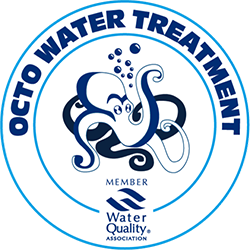In this article, we are going to discover why testing the residual sterilisation is required on a weekly basis, and why it plays a critical role in maintaining the efficacy of sterilisation systems and ensuring that the water supply meets the highest standards of purity.

The Problems of Inadequate Water Sterilisation
Effective Sterilisation Techniques: Hydrasil and UV Systems
The most effective way to [sterilise water onboard superyachts] is by using the chemical HydrasilAg+, with the use of UV sterilisation as a secondary form of sterilisation. Each method offers distinct advantages and contributes to maintaining a safe and hygienic water supply. Silver and copper ionisation is also an effective sterilisation solution if used in the right conditions.

Hydrasil: An Eco-Friendly Form of Sterilisation
By using our Integrated Treatment System, HydrasilAg+ is a unique silver stabilised hydrogen peroxide with the addition of elements to maintain silver ion stability. This allows us to treat the water, while remaining unaffected by any chloride that may be present.
The silver ions help to disrupt the cell wall, drawing a large quantity of peroxide directly on to the cell. This prevents the bacterium from emitting a catalase, which is an enzyme that normally destroys hydrogen peroxide. In this mechanism the silver ion is not destroyed, and so also acts as a catalyst that allows it to penetrate, remove, and treat biofilm as well as any bacteria that are present.
Hydrasil is exceptionally stable allowing a better length of treatment compared to other hydrogen peroxide products. Its exceptional balance of silver and other stabilising elements makes it the most effective product available.
UV Sterilisation: A Secondary Form Of Water Sterilisation
UV sterilisation should only be used as a secondary form of sterilisation. It does not necessarily kill the bacteria but instead inactivates them, rendering them unable to multiply.
One disadvantage when solely relying on UV treatment is that the disinfection only works when the water passes through the treatment chamber. Meaning it does not protect against further contamination from growth in the distribution network. UV sterilisation should therefore not be used as a stand-alone treatment system.
There are however advantages of using a UV system alongside other forms of sterilisation. It cuts down the work of the sterilisation residual as well as reducing the available organic carbon required by the bacteria to sustain binary fission.

Regular Residual Sterilisation Testing: Ensuring Continuous Protection
To maintain the effectiveness of sterilisation systems, weekly residual sterilisation testing is essential. Octo Marine emphasises the importance of these tests and offers comprehensive water testing and analysis services to ensure water safety on superyachts.
Hydrus Laboratory SAS: A Trusted Partner in Water Testing
Hydrus Laboratory SAS plays a crucial role in ensuring the accuracy and reliability of residual sterilisation testing onboard superyachts. Their adherence to ISO/IEC 17025:2017 standards and their extensive experience in maritime water testing makes them a trusted partner for industry stakeholders.
Upholding Water Quality Standards: Adhering to Maritime Regulations
The Maritime Labour Convention (MLC) 2006, a set of international labour standards for the maritime industry, places a strong emphasis on ensuring the safety of water onboard ships and vessels. Compliance with MLC 2006 regulations is mandatory for superyachts, and residual sterilisation testing is a key component of maintaining compliance.

Prioritising Water Quality for Superyacht Well-being
Weekly residual sterilisation testing stands as a cornerstone of safeguarding the health and well-being of passengers and crew onboard superyachts.
Octo Marine remains committed to advocating for proactive measures in maintaining the highest standards of water quality. By prioritising comprehensive water treatment solutions, including filtration, sterilisation, and testing, Octo Marine empowers yacht owners to ensure the safety and purity of the water supply, contributing to a healthier and more enjoyable onboard experience for guests and crew.
Use and drink your water in confidence, compliance, and comfort with Octo Marine. Get in touch today to find out more.



